Your Chess Glossary Gets You Up to Speed
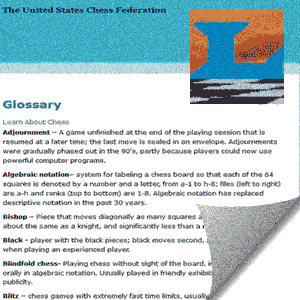
Welcome to the chess glossary directory. This is where you can find definitions for any term used in chess. Chess is full of terms that you would not have heard of in everyday life.
There are tons of terminology in chess. Actually there are so many words and phrases associated that maybe they should start thinking of it as a language called chess. It can overwhelm a novice or even someone who knows quite a bit about chess.
Here you can find references to any and every chess term out there. You can also see where they fit in with the basic chess rules.
Starting Out with Chess Lingo
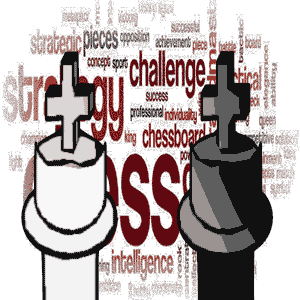
Ready to deepen your grasp on chess rules? You want to understand what people are talking about with all these unfamiliar chess words and phrases?
This new chess vocabulary that you are seeing everywhere will only become more important. Over and over again you're going to hit new words. You're going to be looking up meanings for these strange terms.
Wouldn't it be handy if you could look them all up in one place? One handy spot you could use as a reference until you know them all like old friends. But then again why do you need to know these words? Can't people just use plain English?
Why All the Chess Jargon?
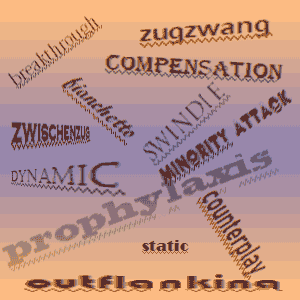
Why bother learning all this jargon? Shouldn't you just concentrate on the latest innovation in your favorite opening system? A few hours working on your tactics would surely be more productive?
Well I guess the thing is the text books are full of this kind of talk. You go online somewhere and study the games of the masters, they might be annotated for you. The experts might be explaining the game as you go through it, explaining the techniques of the great players.
They might mention things like breakthrough, compensation, counterplay, dynamic, fianchetto, minority attack, outflanking, prophylaxis, static, swindle, zugzwang or zwischenzug to name but a few. When you encounter these terms as you study, it certainly would be nice to know what they mean.
Heard of These Terms Before?
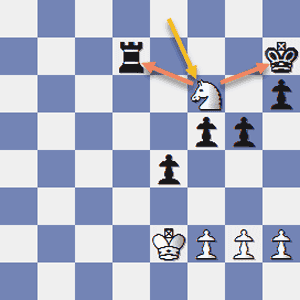
Chess Glossary - Have you ever heard of the fork? Knights are famous for them!
Soon you'll be trying to get active pieces, looking to blockade pawns, overprotect key points. You'll be wanting to get a great outpost for your Knights, target backward pawns, overload enemy pieces.
You must learn how to play an open game, learn how to play a closed position. Soon you'll understand the need to win the center in the opening, dominate open files and diagonals in the middlegame, centralize your pieces in the endgame.
You will pick up the intricacies of playing either side of the isolated d-pawn. You may hear about the elasticity of minor pieces or the ins and outs of pawn islands. Think you have a problem child at home? You can get one on the chess board too!
Here's Some More Chess Words
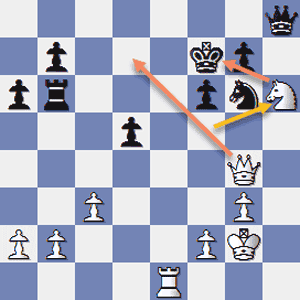
Chess Glossary - Outfox your opponents with tactical maneuvers
Do you play the gambit or don't ya? You better get something good from it. You might wonder what's going on if your pawn gets taken en passant. After some time playing chess you may achieve a high ELO rating.
Good players try not to leave their pawns en prise. This is sometimes difficut if they find themselves in zugzwang. You can put your opponent in zugzwang after maybe a series of clever intermezzos. One way to get a good mating attack going is to maneuver your minor and major pieces into good posts. There they can achieve harmony and get to grips with the enemy Kingside.
If you have to work on the Queenside you can always opt for a minority attack. This often works well when there is a Carlsbad pawn structure. If you want to know what I've been talking about the last while it's time to check out some good glossaries.
Moving On
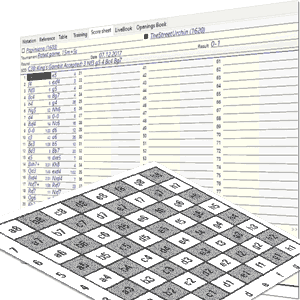
Well now you're armed to the teeth with terms and definitions. Nothing can ruffle you now. You know where to come if you've been on some forum and you see someone use a term you've never seen before.
It's a good start when you're learning the rules to have a reference or two handy for those strange words. And I bet even if you've been playing for a while you will find a few words in there that you haven't seen before.
Getting to grips with terminology represents a good start. The next step on the road is to familiarize yourself with chess notation.

